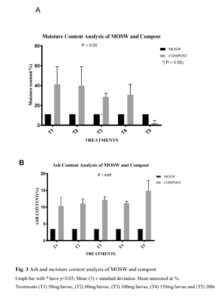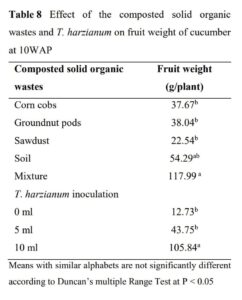Purpose Maize (Zea mays L.) is a major crop grown and consumed in Nigeria but poor soil quality has resulted in low yield. This study assessed the quality of compost produced from agricultural wastes and its impact on the yield of Zea mays L. Method The composting process was carried out on a windrow (2 […]
Purpose: Sludge treatment and reuse as a fertilizer is of great significance in Gaza Strip. This study aimed to treat sludge generated at North Gaza WWTP, to produce rich nutrients fertilizer, to apply it in a greenhouse, and to compare its performance with different fertilizers. Method: The concept of drying beds was applied to 1500 […]
Purpose In Bangladesh, the sludge of textile effluent treatment plant has been considered as a potential environmental threat due to its huge volume and chemical content. Thus, the present study was carried out to assess the reuse possibility/potentiality of textile sludge in agricultural applications. Method Textile sludge was applied at different loading ratios (0–100 % […]
Purpose Effective vermicomposting of Salvinia natans is a good alternative for protecting wetlands damaged by the weed due to the vast potential for use of the product vermicompost in agriculture, but the presence of toxic metals in the weeds may deter the usage. Methods Research was carried out on the physico-chemical and biological characteristics as […]
Purpose The study evaluates and provides an overview of the nutritional importance of 19 selected food wastes as aids in human/livestock/soil/plant health. Methods Nitric acid-digested extracts of food wastes belonging to four different classes (fruits, vegetables, oilseeds and beverages) were analysed for different elements in an inductively coupled plasma mass spectrometer. Results Our study recommends […]
Purpose Flower waste dumping in landfills and other disposal sites is causing major environmental issues due to its highly biodegradable nature. Instead, flower waste can be successfully composted for its higher nutrient value. Therefore, this study evaluated the pile composting of flower waste with different combinations of cow dung and saw dust to produce stabilized […]
Purpose To investigate the effect of vermicomposted kitchen, market and tea wastes on tomato growth and yield and assess the benefits and costs that arise. Method A field experiment arranged in the randomized complete block design with five experimental treatments: vermicomposted kitchen, market, tea wastes, NPK fertilizer and a control, replicated thrice was conducted. Data […]
Purpose The study assessed the quality of compost produced by the Black Soldier Fly Larvae (BSFL) in terms of the compost nutrient level, microbial activities, and the bioaccumulation of possible heavy metals in the organic solid waste. Method The study used the pre-experimental study design, one-group pretest-posttest to obtain the data. Five experimental units were […]

Purpose Soil nutrient depletion and possible degradation have been highlighted as key reasons for lower crop yields in Nigeria. The present study was aimed to assess the effect of Trichoderma harzianum on the bioconversion of different solid organic wastes into compost and its application on cucumber. Method The treatments were 3 levels of T. harzianum inoculum (0, 5 and 10 ml) and 4 types of solid […]
